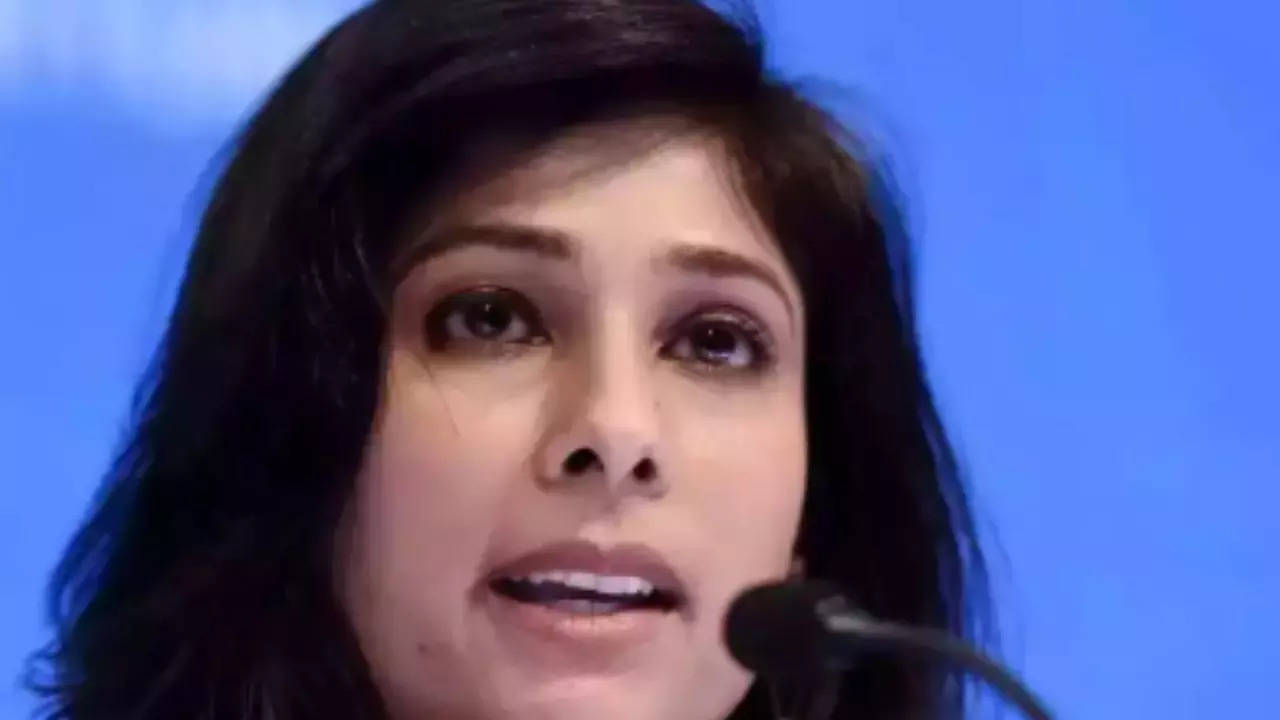[ad_1]
IMF’s first deputy managing director Gita Gopinath was in Gandhinagar for the meeting of the G20 finance ministers and central bank governors. In an interview with TOI, she cautions on the adverse impact of generative AI and recommends regulation, and says even technologists have called for it. Excerpts:
Is global inflation becoming more broad-based?
Headline inflation appears to have peaked last year, but in many countries core inflation, which has come down slightly, is still quite high. That is the challenge central banks are facing, including in the US and Euro area. Our advice is to stay the course and to maintain a restrictive monetary policy stance as long as there are signs that core inflation is durably going to return back to target.
We say it’s important to be data dependent because these are uncertain times and a lot of interest increases have already happened, but we also caution central bankers against prematurely easing policy, given the experience we have from the 1970s.
How do you see the rate tightening affecting growth?
You should expect to see slowing growth, labour markets will have to soften, we are at record low unemployment rates in many G20 countries. In terms of spillovers, this is a deeply integrated world, with trade and financial links, and when interest rates go up, the cost of borrowing goes up in other countries. This time, especially the stronger emerging markets, have handled this very well and we haven’t seen debt distress. We do see frontier markets and some vulnerable emerging markets that are being shut out of financial markets and having to buy atextremely high interest rates. For them the solutions include IMF programme, debt restructuring in several cases. It is important for the world as a whole that the US is able to win the fight against inflation.
Several agencies see India as one of the bright spots in the global economy. What are the challenges that need to be addressed?
When you look at India’s growth rate, and compare it with other emerging and developing markets, it is certainly a bright spot. In terms of the headwinds, there could be spillovers if growth slows down more dramatically than we project or if inflation is a more stubborn problem in advanced economies, which require central banks to raise rates.
Do emerging technologies such as generative AI affect employment in countries such as India, which have a large young population?
For many parts of the world, we have very strong job markets. In many developing countries we have a skill mismatch between the kind of jobs being generated and the skill that people have. That remains a challenge. How technology is going to affect jobs will depend on the kind of automation you have. Automation in the car industry generated the hollowing out of the middle class in many countries. The early evidence we are seeing of generati-ve artificial intelligence is that it is more of a leveller, which means it creates more junior positions and higher wage increases in these positions. The reason is that you are able to transfer the knowledge that comes with experience to the junior workers through generative AI technology. We also have to be careful that generative AI will create new kinds of productive jobs.
What are the risks of these technologies and is it time to start regulating them?
On regulation, we have to be careful about making sure that generative AI is used for the benefit of humanity. We are aware of the risks associated with it and issues with biases in how we summarise data, AI hallucinations. We need proper regulations to protect consumers. In the labour market we need the right amount of skill, maybe lifelong learning. It’s also important to have social safety nets to ensure that those who are losing jobs get state support and can come back into the workforce. On the tax policy front, we need to make sure that you are not incentivising the use of AI because capital taxes are lower than labour taxes. There there have to be globally settled rules on this front.
Who will set those rules?
Many agencies have stepped in — the EU that is coming up with regulations, the UN is talking about the role it will play, G20 has a working group and G20 at some point is likely to take up this area too.
Is global inflation becoming more broad-based?
Headline inflation appears to have peaked last year, but in many countries core inflation, which has come down slightly, is still quite high. That is the challenge central banks are facing, including in the US and Euro area. Our advice is to stay the course and to maintain a restrictive monetary policy stance as long as there are signs that core inflation is durably going to return back to target.
We say it’s important to be data dependent because these are uncertain times and a lot of interest increases have already happened, but we also caution central bankers against prematurely easing policy, given the experience we have from the 1970s.
How do you see the rate tightening affecting growth?
You should expect to see slowing growth, labour markets will have to soften, we are at record low unemployment rates in many G20 countries. In terms of spillovers, this is a deeply integrated world, with trade and financial links, and when interest rates go up, the cost of borrowing goes up in other countries. This time, especially the stronger emerging markets, have handled this very well and we haven’t seen debt distress. We do see frontier markets and some vulnerable emerging markets that are being shut out of financial markets and having to buy atextremely high interest rates. For them the solutions include IMF programme, debt restructuring in several cases. It is important for the world as a whole that the US is able to win the fight against inflation.
Several agencies see India as one of the bright spots in the global economy. What are the challenges that need to be addressed?
When you look at India’s growth rate, and compare it with other emerging and developing markets, it is certainly a bright spot. In terms of the headwinds, there could be spillovers if growth slows down more dramatically than we project or if inflation is a more stubborn problem in advanced economies, which require central banks to raise rates.
Do emerging technologies such as generative AI affect employment in countries such as India, which have a large young population?
For many parts of the world, we have very strong job markets. In many developing countries we have a skill mismatch between the kind of jobs being generated and the skill that people have. That remains a challenge. How technology is going to affect jobs will depend on the kind of automation you have. Automation in the car industry generated the hollowing out of the middle class in many countries. The early evidence we are seeing of generati-ve artificial intelligence is that it is more of a leveller, which means it creates more junior positions and higher wage increases in these positions. The reason is that you are able to transfer the knowledge that comes with experience to the junior workers through generative AI technology. We also have to be careful that generative AI will create new kinds of productive jobs.
What are the risks of these technologies and is it time to start regulating them?
On regulation, we have to be careful about making sure that generative AI is used for the benefit of humanity. We are aware of the risks associated with it and issues with biases in how we summarise data, AI hallucinations. We need proper regulations to protect consumers. In the labour market we need the right amount of skill, maybe lifelong learning. It’s also important to have social safety nets to ensure that those who are losing jobs get state support and can come back into the workforce. On the tax policy front, we need to make sure that you are not incentivising the use of AI because capital taxes are lower than labour taxes. There there have to be globally settled rules on this front.
Who will set those rules?
Many agencies have stepped in — the EU that is coming up with regulations, the UN is talking about the role it will play, G20 has a working group and G20 at some point is likely to take up this area too.
[ad_2]
Source link











More Stories
India’S Growth Forecast: S&P ups India’s FY’24 growth forecast to 6.4% on robust domestic momentum
India to remain fastest-growing major economy, but demand uneven: Poll
Jack Ma: Jack Ma gets back into business with ‘Ma’s Kitchen Food’